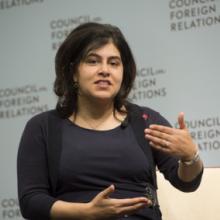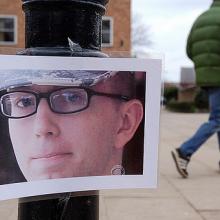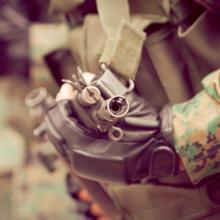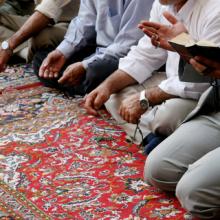Iraq
When I first saw Americans joining in solidarity with Iraqi Christians through the #WeAreN hashtag and protest campaign, I was encouraged. Our team at Preemptive Love Coalition had been sounding the alarm about the targeted persecution of minorities in Iraq through private emails and social media messages for weeks, in between making urgent appeals in our effort to provide lifesaving heart surgeries for children amid the violence.
Most of our efforts were largely unsuccessful before the “Islamic State” gave Mosul’s Christians an ultimatum to (1) convert to Islam; (2) pay a submission tax; or (3) “face the sword.”
After Islamist militants began marking the homes of Christians in red paint with the Arabic letter “N” (Nazarene) for extermination or expropriation, we tried again to use our proximity to the problem in Iraq to provoke our friends in America to pay attention by tagging a photo “#WeAreN,” in which I had symbolically marked myself with an Arabic “N.”
But it was not strictly an act of solidarity with Iraqi Christians. We had the targeting of Turkmen, Yezidi, Shabak, and even Sunni Muslims in view, as well. #WeAreN was more about the marking of Christians; less about the marking of Christians.
Muslims and minorities across Iraq immediately sensed the gravity of the tactics deployed by the Islamic State: if one group is marked, we are all marked. If we stand by in silence today while others are marked for extinction, our time will come, and there will be no one left to stand for us.
In response, Muslims across Iraq joined together in protest, prayer, and viral photographs saying “We are Iraqi. We are Christians.”
America is stunned by what is happening in Iraq right now, and happening so quickly. We may be facing the worst terrorist threat to international security so far — despite all we have done and sacrificed. Both our political leaders and media pundits are admitting there are no good options for the U.S. now. But there is an option we could try for the first time: humility. Let me turn to two biblical texts that might provide some wisdom for both the religious and non-religious.
If your enemies are hungry, feed them; if they are thirsty, give them something to drink; for by doing this you will heap burning coals on their heads. Do not be overcome by evil, but overcome evil with good. (Rom. 12:20–21)
Blessed are the peacemakers, for they will be called the children of God. (Matthew 5:9)
All nations use propaganda to tell half-truths and spread misinformation about their enemies, which should be honestly challenged. Even so, it is also true that we have real enemies in this world, as individuals, groups, and nations. To assume otherwise is foolish, from the perspective of history, certainly, but also in light of good theology about evil as part of the nature of the human condition. According to the Bible, even our faith communities will encounter enemies. Jesus’s teaching assumes that we will have enemies, and he teaches us how to treat them. In the passages above, Jesus and Paul the Apostle offer guidance for more effective ways of dealing with our enemies. It seems to be clear that our habit of going to war against them is increasingly ineffective. For the past several years, we have found ourselves in a constant state of war with “enemies” who are very hard to find or completely defeat.
WHEN CHIEF MASTER Sergeant Harry Marsters returned in 2008 from his time in Iraq, he knew something wasn’t right. At 54, the 32-year veteran of the Air Force—with 27 years full time in the military and the remainder as a reservist with the Air National Guard—felt that as one of the “older folks” he knew what to expect upon return from his assignment with the communications squad at the Kirkuk Regional Air Base in northern Iraq.
Marsters’ squadron trained Iraqi forces in the operation and maintenance of aerial surveillance equipment on the base, which housed 1,000 Air Force and 2,500 Army troops. As first sergeant he acted as a liaison to the Air Force troops and ensured the well-being of those stationed there. It was a job he relished, pouring care into building connections with the airmen and women, spending time with the chaplains, and coordinating recreation and morale-building activities.
Though Air Force personnel never left the base, they were subjected to the ever-present threat of randomly timed mortar rounds launched by insurgents. They also took part in nighttime “patriot details” in which Air Force personnel and soldiers lined the base’s runway as the bodies of fallen soldiers were loaded onto planes for transport back to the United States. But Marsters says he was most upset by what he felt was harsh treatment of the Iraqi nationals who came to work on the base.
“They were treated like criminals,” he says of the extensive searches and intimidation Iraqis received when going through base security. “Everyone in Iraq is not evil, bad, and nasty. It’s a very small group of people who are raising hell and trying to hurt the country. The average person is just trying to make some money and take care of his or her family.”
The highest-ranking Muslim in the British government on Friday called on Western governments to do more to protect besieged Christian minorities across the world, particularly in the Holy Land where they are now seen as “outsiders.”
Baroness Sayeeda Warsi, the government’s minister for faith and the first Muslim member of a British cabinet, said religious freedom is a proxy for human rights and must not be an “add-on” to foreign policy.
“A mass exodus is taking place, on a biblical scale,” she said in a speech at Georgetown University. “In some places, there is a real danger that Christianity will become extinct.”
A huge statue of the Virgin Mary towers over churches, monasteries and mosques in the Syrian city of Maaloula, where a dialect of the Aramaic language of Jesus is still spoken.
The town has managed to stay out of the Syrian conflict between Sunni Muslim rebels and the regime of dictator Bashar Assad, as have most of Syria’s 2 million Christians.
But worsening violence has forced the community into a corner: Continuous clashes between the rebels and the regime in this isolated town of 2,000 people as well as other Christian towns over the past two weeks have many Christians worried that they will no longer be allowed to stay neutral.
A military judge ruled Tuesday that Pfc. Bradley Manning was not guilty of aiding the enemy. In 2010, he was arrested for allegedly passing classified materials to the website WikiLeaks. If Manning had been found guilty of aiding the enemy, he could have been sentenced to life in prison. The sentencing phase of the trial will begin Wednesday.
The New York Times reports:
Private Manning had already confessed to being WikiLeaks’ source for a huge cache of government documents, which included videos of airstrikes in which civilians were killed, hundreds of thousands of front-line incident reports from the Afghanistan and Iraq wars, dossiers on men being held without trial at the Guantánamo Bay prison, and about 250,000 diplomatic cables.
But while Private Manning had pleaded guilty to a lesser version of the charges he was facing, which could expose him to up to 20 years in prison, the government decided to press forward with a trial on a more serious version of the charges, including “aiding the enemy” and violations of the Espionage Act, which could result in a life sentence.
By now most of the world knows the royal family in England is celebrating the birth of little baby George Alexander Louis. The commentators panted as they caught the first glimpses of the magic baby, about everything from the infant's apparent ability to withstand a media onslaught to the ever-so-newsworthy fact that his father drove the family home with his own two hands.
Meanwhile in Iraq, several hundred prisoners of the infamous Abu Ghraib facility escaped, many of whom were known or suspected members of Al Qaeda. Considering the attention given to the few dozen detainees still held in Guantánamo Bay, it seems reasonable to think that such a breakout would arrest the headlines around the globe.
But instead, we stayed focused for the most part on baby George. I remarked about this to my friend, sharing my concern about the apparent distortion of priorities. He suggested that it simply is a sign of cultural fatigue, or even resignation. Sometimes, after all, these stories that have international importance seem so big, so abstract, and so far away that it is hard to wrap our minds around them. It’s easier instead to set our attention on something more hopeful — albeit remarkably more superficial — that won’t keep us awake at night.
THE FONDEST memories I have of Kathy Kelly are of her singing. It’s safe to say that her three nominations for the Nobel Peace Prize were not for her voice, which is sometimes sweet but often a touch out of key. At times I’ve imagined her feeling briefly self-conscious about this, but that passes. The song remains, and I am again reminded of just how deeply this woman can move me.
In spring 1999, in a small banquet room at Georgetown University, I first heard Kelly sing and speak about the suffering in Iraq. A crowd of about 200 people had gathered to hear about her work. She had been to Iraq dozens of times to put a human face on the conflict there and to defy the drastic financial and trade embargo that the U.N. Security Council had imposed shortly after Iraq’s 1990 invasion of Kuwait.
She briefly went over the statistics—the deep poverty, the lack of medicines, the estimated half-million children who had died, many due to the U.N. sanctions, enforced in part by a U.S.-led blockade—but she quickly moved on. Statistics weren’t her strength.
Instead she spoke from the heart. Kelly talked about the ordinary Iraqis she had met: the worn women who served her tea and biscuits they could barely afford, the countless kids in threadbare hand-me-downs who ran after her merrily in the street, the tired doctors who broke down crying as they remembered all the children they had lost, the stone-faced parents who accepted her condolences because they didn’t know what else to do.
She also told the story of Zayna, a 7-month-old baby girl who died of malnutrition shortly after Kelly visited her in the hospital.
A fundamental principle [of ancient Greek tragedy], often overlooked, is that the double and the monster are one and the same being.
- René Girard, Violence and the Sacred (p. 160)
The debate about the use of drone strikes in the so-called “War on Terror ” has shed light on an inevitable calculus of war: how many civilian casualties can be tolerated in pursuit of our goals? President Barack Obama, in his speech on May 23 at National Defense University, referred to the drone strikes in Pakistan, Yemen, and Somalia, admitting, “It is a hard fact that U.S. strikes have resulted in civilian casualties, a risk that exists in all war.” But of course, our wars and our use of drones were conceived as a legitimate response to the civilian deaths on 9/11 and a defensive maneuver to prevent future attacks.
Obama Defends Drone Attacks
In his speech, Obama further justified the use of drones by stating it reduces the number of civilian casualties compared to boots-on-the-ground wars. Though the numbers are hard to determine, it has been reported by the Canadian Broadcasting Corporation that civilian casualties caused by our invasion of Iraq number somewhere between 55,000 and 60,000. In Afghanistan, from the time reporting began in 2007, the Guardian reports that the total number of civilians who have lost their lives in the armed conflict to be 14,728. For drone strikes, the highest estimates put total civilian deaths at around 950, indisputably a better number.
The Illogical Logic of Violence
Reducing the number of deaths caused by our use of violence is a worthy goal, and Obama does seem genuinely engaged in drawing the number down. So for the sake of argument, I will take him at his word. But (you knew there was a but coming!), he is trapped, as so many of us are, within the logic of violence.
IT'S BEEN SAID that one of the most radical things Jesus did was to eat with the wrong crowd. Undoubtedly, folks on the Left were frustrated with Jesus for making friends with Roman tax collectors. And folks on the Right were surely ticked at him for hanging out with Zealots. Dinner must have been awkward with both of them at the table; after all, Zealots killed tax collectors for fun on weekends.
But Jesus was a subversive friend, a scandalous bridge-builder, a holy trespasser. Just as we are known by the company we keep, so was Christ—accused of being a "glutton and a drunkard, a friend of tax collectors and sinners" (Luke 7:34). He was put on trial for being a rabble-rouser and a traitor. He got in trouble with the religious elite for crossing the line, overstepping purity laws and cultural norms, and disrupting the status quo. His love had no bounds and his friendships defied categories. He insisted on calling his followers friends: "I no longer call you servants, because a servant does not know his master's business. Instead, I have called you friends" (John 15:15).
Jesus made friends—with folks who adored him and folks who hated him. He sat with the woman at the well, washed the feet of his disciples, wept at the death of his buddy Lazarus, and loved his mom and dad. But his love went beyond borders. He redefined family, inviting his followers to be "born again" and discover an identity that runs deeper than biology. He challenged the chosen and included the excluded—in the family of God.
I wonder who Jesus would be hanging out with if he were around today?
Today, March 19, 2013, is the 10th anniversary of the “Shock and Awe” campaign that was intended to rid the world of the threat of Saddam Hussein’s weapons of mass destruction in Iraq. As it turned out, the threat was a lie. There was ample evidence at the time to prove that the WMDs didn’t really exist, but were manufactured in Saddam’s imagination for political gain.
So why did we fall so easily for this lie? Answers to this question often come via an analysis of the particulars of the Iraqi situation and include discourse about oil fields, geopolitical calculations, even psychological analysis of the relationship of Father and Son Bush. These are good discussions to have. We can learn a great deal from them about our thirst for security and insatiable appetite for oil, political power, and revenge.
"Blessed are the peacemakers, for they shall be called sons [and daughters] of God.”
Matthew 5: 9 from the Beatitudes
I grew up watching casualty reports from the Vietnam War on TV. My Uncle Bill, a lieutenant colonel in the Air Force, was serving there. My family watched the news every evening to learn about the latest casualty reports. I was too young to understand the anxiety of my parents, but I felt the tension while Uncle Bill was deployed.
As an adult, it’s been a different story. I understand and experience things more fully and have an emotional connection to what I see and hear. That has been true for the last decade. Ten years ago, the Iraq War began. Ten years marked by conflict, violence, and loss. Ten years of debate about why we went to war and why we remained. Ten years dealing with death and injury – 4,488 U.S. deaths and 32,321 soldiers coming home with significant injuries. Suicide rates of soldiers are so high it is impossible to ignore – some while in Iraq and others after returning home. Traumatic brain injuries, grieving families, moral injury, and multiple limb loss are just a few of the constant reminders of the tremendous costs of war. The toll on the nation’s economy has been long lasting as well. The jobless rate among veterans is staggeringly high.
The human toll has been significant. But military personnel aren’t the only causalities of this war. Numbers vary, but statistics tell us more than 100,000 Iraqi citizens also have been killed and nearly 3 million have been displaced.
These figures cannot be ignored. And they are the results of war.
 A few weeks back at the Justice Conference we had the chance to sit down with Jeremy Courtney, cofounder of the Preemptive Love Coalition, to tell the story of his amazing work in Iraq providing heart surgery for children.
A few weeks back at the Justice Conference we had the chance to sit down with Jeremy Courtney, cofounder of the Preemptive Love Coalition, to tell the story of his amazing work in Iraq providing heart surgery for children.
Special thanks to Matthew Willingham and everyone at the Preemptive Love Coalition for providing us with footage from Iraq to tell their story.
The video below is a first in our new series Sojo Stories, where we sit down with individuals to hear their stories about using their talents for the common good.
We’re approaching the 10th anniversary of the invasion of Iraq — an appropriate time to reflect upon the antiwar ferment that gripped the globe at that time.
Virtually the entire world opposed the U.S.-led invasion. Feb. 15, 2003 was the largest single day of antiwar protest in history. An estimated 10 million people demonstrated against the war in hundreds of cities on every continent — more than a million in London and hundreds of thousands in Barcelona, Rome, Sydney, Berlin, and New York.
John McCain angrily insisted on “right” and “wrong” answers to his questions of Chuck Hagel yesterday. As a theologian and a religious leader, I want to say that John McCain is “wrong.”
I watched the hostile questions that Sen. McCain asked Hagel in the hearings on his nomination for Secretary of Defense. The angry attacks from McCain were about the Iraq War, for which McCain was one of America’s leading advocates. Hagel had previously called the war in Iraq the biggest American foreign policy mistake since Vietnam. Obviously furious, McCain tried to force Hagel to say the last “surge” in Iraq, which McCain had made his cause, was right after all. Despite the aggressive and disrespectful questioning from his former “friend,” Hagel wouldn’t submit to McCain’s demands and said these questions would be subject to history — and to theological morality, to which John McCain has never submitted his views. In fact, his repeated desire to invade other people’s countries is offensive moral hubris.
Ross Douthat posits that President Obama’s nominations of former Sen. Chuck Hagel as Secretary of Defense and John Brennan as Director of the Central Intelligence Agency represent the synthesis of two strains in former President George Bush’s foreign policy. Hagel as one of those who turned against the war in Iraq, and Brennan as one of those who defended controversial counterterrorism policies.
“To the extent that it’s possible to define an “Obama Doctrine,” then, it’s basically the Hagel-Brennan two-step. Fewer boots on the ground, but lots of drones in the air. Assassination, yes; nation-building, no. An imperial presidency with a less-imperial global footprint.
“This is a popular combination in a country that’s tired of war but still remembers 9/11 vividly. Indeed, Obama’s foreign policy has been an immense political success: he’s co-opted foreign policy realists, neutralized antiwar Democrats and isolated Republican hawks.”
Counter-insurgency wars, such as those in Iraq and Afghanistan, frequently place soldiers in morally ambiguous situations. What they did or didn’t do in those situations can leave lasting moral effects. Following an epiphany at an antiwar rally, Rev. Rita Nakashima Brock:
“… has devoted the years since then to tending the spiritual wounds of warriors, seeking theological answers to the condition among veterans called “moral injury.” In her current position at Brite Divinity School in Fort Worth, she has begun the first program in the nation to develop a treatment that she terms 'soul repair.'
“Moral injury might best be defined as an affliction of the soul, as distinct from a specific mental health condition like post-traumatic stress disorder. It arises, to speak in a very broad way, from the way a combatant’s actions in war seem to violate and thus undermine the most deeply held moral beliefs.”
Her “Soul Repair Center” is now teaching congregational leaders how to address moral injury among veterans.
The variation in the proper way to pray is one among several differences that exist between Shiites, who make up about 15 percent of Muslims globally and in America, and the majority of Sunnis. Until recently, those differences mattered little in the United States, where the two groups bonded as Muslim minorities and prayed in the same mosques.
"There weren't enough of either to justify the cost of building sectarian mosques, and because in general, early generation immigrants were less focused on establishing formal houses of worship," said Andrea Stanton, a religious studies professor at the University of Denver.
That is changing, however, as American Shiites are increasingly establishing their own mosques. According to "The American Mosque 2011," a survey sponsored by several Muslim American organizations, 7 percent of roughly 2,100 mosques in America are Shiite, and most have been built in the last 20 years.
One reason: Shiites have become numerous and financially strong enough to manage the expensive process of buying or building their own mosques. Another factor: the growth in Shiite populations as immigrants flee persecution in Iraq, Bahrain, Saudi Arabia, Afghanistan, and Pakistan, where Taliban gunmen recently executed at least 22 Shiite bus passengers.











